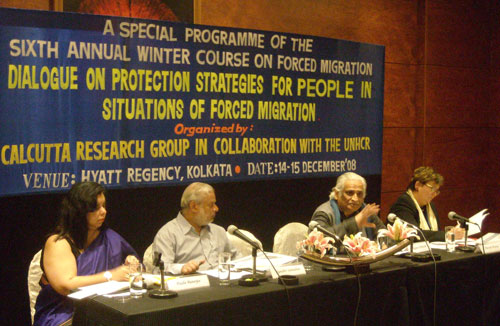The history of forced migration has presently been recognised as a history of mixed and massive flows of people, which have rendered, to a considerable extent, the older forms of protection inadequate. These early signs of new kinds of flows on the map of forced migration have led governments and humanitarian agencies to adopt newer strategies to cope with massive displacements and unrest. In this context - of massive and mixed flows of forced migration and the need for newer strategies to handle such migrations - Mahanirban Calcutta Research Group (CRG) proposed to UNHCR to hold a dialogue that would focus on the relevant experiences of South Asia. The UNHCR graciously accepted this proposal in the spirit of collegiality.
This CRG-UNHCR partnership is not sudden; there is a history behind this. CRG and UNHCR first came together over a decade back when UNHCR requested CRG to take up a study on Refugees in West Bengal. That study was followed by another study on fifty years of India’s experiences in asylum practices and practices of protection and care for refugees. By that time CRG had become internationally recognised as an expert South Asian group on forced migration. The two studies that CRG undertook in partnership with UNHCR were published as research volumes and were widely recognised as two of the most comprehensive analyses of refugee protection and care by a post colonial state. By this time there were discussions between the UNHCR India office and CRG as to how the extensive material and knowledge gathered from the two studies could best be utilised and disseminated among interested groups. CRG had also started around that time and in collaboration with the Brookings Institution a study on Internal Displacement in South Asia. It was with the support from the UNHCR, Brookings Institution, and the Government of Finland that CRG decided to begin a regular programme of an annual course on forced migration as a way to disseminate the knowledge and the expertise among concerned sections of societies of South Asia.
The Annual Winter Course on Forced Migration began in 2003 and continues till date. In course of consultations between CRG and the UNHCR on the Sixth Course the idea emerged that the Sixth Course could have a special segment on protection strategies in the wake of the emerging situation of forced migration in form of mixed and massive flows, where experts from all over South Asia along with key UNHCR personnel, engaged with the South Asian situation, could participate and deliberate on possibilities of new protection strategies. The UNHCR’s 10 point Action Plan formed the backdrop of the discussion. The Conference reflected in this way a large range of experiences. It also showcased the information, knowledge, and policies being debated and deliberated in the CRG Programme on Forced Migration through these six courses. The following report and the recommendations adopted at the dialogue reflect the new knowledges, fruitful collaboration at various levels, and the sustained network of human rights activists and concerned scholars of South Asia engaged with issues of forced migration, and the possibilities of opening up dialogues with policy makers in South Asia on the need for new strategies of protection of victims of forced migration.
Readers will note that the words conference and dialogue are inter-changeably used here, for the conference was truly a dialogue. It was also a workshop in the sense that it was structured to ensure close and minute discussions, and to provide scope for covering a wide array of issues relating to protection. The programme schedule of the conference bears testimony to that. CRG did not intend to hold the conference as a solitary event only. It has plans and seeks further cooperation of all to carry forward the work and implement the recommendations emanating from the conference. The recommendations of the conference ware read out by Monserrat Feixas Vihe, the Chief of Mission, UNHCR, New Delhi, at the valedictory session on 15 December 2008. The Governor of West Bengal Shri Gopal Krishna Gandhi, graced the occasion at the Chief Guest.
The Dialogue was held as a special segment of the Sixth Annual Winter Course on Forced Migration, which was held with the support of the UNHCR, Government of Finland and the Brookings Institution. On this occasion CRG particularly thanks the UNHCR in assisting and collaborating in holding the conference. Its thanks are also to the Government of Finland and the Brookings Institution for making the Winter Course an important orientation programme towards protecting the rights of the victims of forced migration. It also thanks the Panos South Asia for reinforcing the media component of the entire winter course exercise.